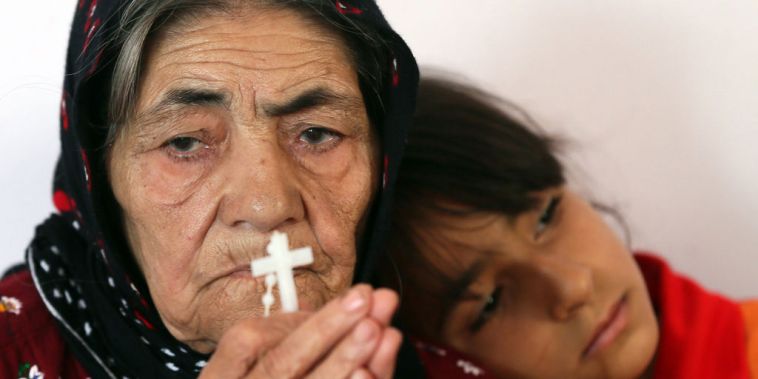The terrorizing of Iraqi Christians, Yazidis and others by ISIL has the attention of the world. Last week, President Obama authorized U.S. airstrikes. Will that be enough? Will they be effective?
Videos By Rare
What else can we do? What should we do?
On Sunday, Senator John McCain called for increased U.S. military involvement in Iraq to protect the beleaguered minority groups in that unstable country. McCain blamed the instability on President Obama, who he says removed troops too early from Iraq. McCain joins a chorus of Republican hawks eager to put the sole blame for these developments on the current administration.
“These things happen because of decisions that are made,” said McCain.
He makes a good point. Things do happen because of decisions that are made.
In 2007, CBS’ 60 Minutes interviewed Reverend Canon Andrew White, an Anglican chaplain sent to Baghdad in 1998 by the Archbishop of Canterbury to help Iraqi Christians. CBS News correspondent Scott Pelley conducted the interview:
“You were here during Saddam’s reign. And now after. Which was better? Which was worse?” Pelley asked.
“The situation now is clearly worse” than under Saddam, White replied.
“There’s no comparison between Iraq now and then,” he told Pelley. “Things are the most difficult they have ever been for Christians. Probably ever in history. They’ve never known it like now.”
“Wait a minute, Christians have been here for 2,000 years,” Pelley remarked.
“Yes,” White said.
CBS News summarized:
From the time of Jesus, there have been Christians in what is now Iraq. The Christian community took root there after the Apostle Thomas headed east in the year 35.
But now, after nearly 2,000 years, Iraqi Christians are being hunted, murdered and forced to flee — persecuted on a biblical scale in Iraq’s religious civil war.
The continuing horrific stories and images of Christians, Yazidis and others being slaughtered in Iraq by Islamic extremists are but the latest atrocities committed against religious minorities since the overthrow of Saddam Hussein.
Hussein was a murderous tyrant responsible for terrible human rights abuses. But under Hussein, Iraq’s Christians were relatively protected.
Before the invasion of Iraq in 2003, U.S. leaders were not unaware that getting rid of Saddam could lead to the displacement or slaughter of Iraq’s Christians.
They simply chose not to listen.
U.S. State Department consultant Andrew Doran wrote at The American Conservative in May 2013:
the conflict in Syria and the American invasion of Iraq are linked by a common thread: the failure of the U.S. to consider the effect of its foreign policy on vulnerable religious communities, especially Middle Eastern Christians.
In March 2003, on the eve of war in Iraq, Pope John Paul II dispatched Cardinal Pio Laghi, a senior Vatican diplomat, to Washington to make a final plea to Bush not to invade. Laghi, chosen for his close ties to the Bush family, outlined “clearly and forcefully” the Vatican’s fears of what would follow an invasion: protracted war, significant casualties, violence between ethnic and religious groups, regional destabilization, “and a new gulf between Christianity and Islam.” The warning was not heeded.
Virtually every Republican leader and talking head eager to blame the current plight of Iraqi Christians solely on President Obama’s removal of troops in 2011—a timetable set in motion during the Bush administration and something Iraq’s government demanded—are also completely unwilling to acknowledge any complicity in helping to create this problem by their support of the 2003 U.S. invasion.
To say the past is past and that we must confront the current situation is correct.
But any assessment of past mistakes in Iraq that focuses on the 2011 withdrawal without acknowledgment of the 2003 intervention is delusional.
And would the current tragedies be unfolding if the U.S. had left Iraq five years from now? Ten years? Twenty years? How long should the U.S. have stayed?
https://twitter.com/radleybalko/status/497833420672995328
McCain once suggested we might have to stay for 100 years.
Today, the future of Iraq is uncertain and dismal. The situation for Christians in Iraq, at least according to one prominent Christian leader there, is worse today than it has been in the last 2,000 years.
There are no easy answers. “Things happen because of decisions that are made,” says McCain.
He’s right.

